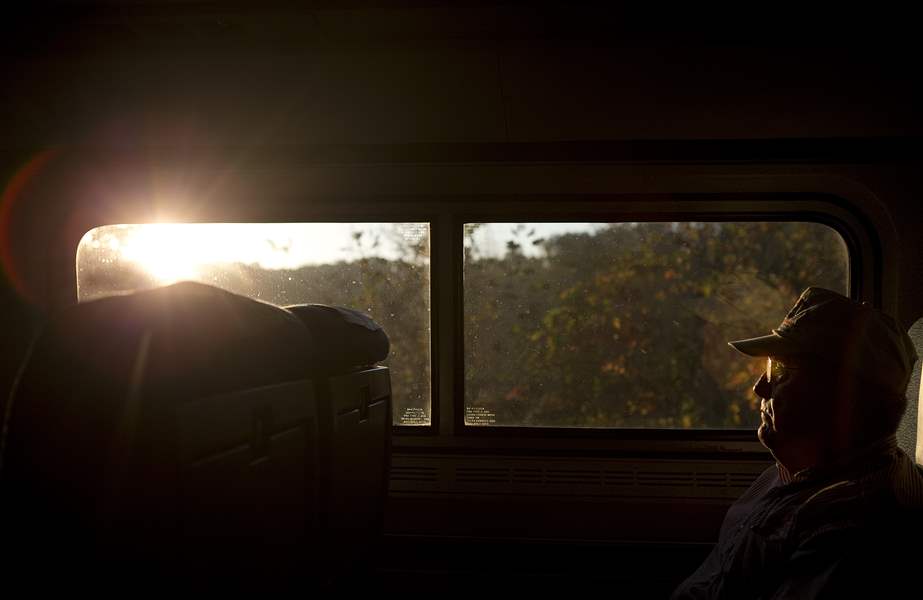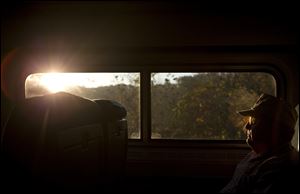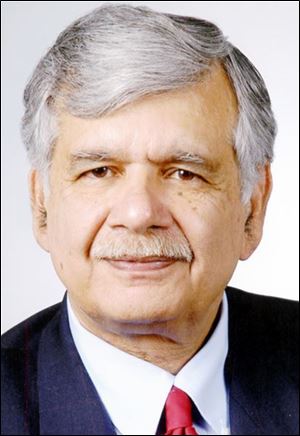
COMMENTARY
Adventures and new friends on a Canadian train ride
11/6/2017

Riding a train allows you to think, read, walk around, and meet interesting people.
ASSOCIATED PRESS

Riding a train allows you to think, read, walk around, and meet interesting people.
On a recent weekend, I rode, as I have done on numerous occasions, the train from Windsor, Ont., to Toronto. It is a 4½-hour ride that is often filled with pleasant surprises. For one, the train staff on VIA Rail Canada are much more polite and courteous than their American counterparts on Amtrak.
Unlike travel by air that confines you to your seat for the duration of the journey or travel by automobile that obliges you to keep focused on the road, riding a train allows you to think, read, walk around, and meet interesting people. And then there is the familiar rhythm and sound, I call music, produced by the wheels and the rails that change when the train passes over a bridge or a culvert. More about the train ride later.
I went to Toronto to visit Dr. Siraj Ahmed, a close friend from our college days in the 1950s. After the passage of 60-odd years, we are still close and our children, scattered over long distances, still keep in touch with one another and never miss an opportunity to get together. Like the characters in the Odd Couple, we have our quirks, but a long friendship allows us to still poke fun at each other and reminisce about our deeds and misdeeds of our younger days.
In Toronto, I had lunch with Dr. Zulfiqar Bhutta, an internationally recognized expert in maternal and child health.
He commutes between Karachi, Pakistan, and Toronto, where he holds high academic appointments at the Aga Khan University and the University of Toronto. As a teacher, I may be allowed some bragging rights. In the early 1970s, a young Dr. Bhutta was my student when I was a junior faculty member at my alma mater Khyber Medical College in Peshawar. As teachers, we often bask in the reflected glory of our students.

HUSSAIN
On one of my previous train rides to Toronto, I had met a group of energetic students of Bosnian and Greek heritage. When conversation drifted from the usual topics of weather, Canadian elections, and the strength of the Canadian dollar, the ancient history of Greece and the former Yugoslavia reared its ugly head. For a moment, my traveling companions ceased to be Canadians, even hyphenated ones, and morphed into fighting men and women from a bygone era.
This time on the train, the experience was just as interesting but without the fireworks.
In the waiting room, I met a retired math teacher from London, Ont., and his wife. We conversed in Punjabi about the Partition of India in 1947 and the shared music between India and Pakistan. He was an ardent fan of Indian vocalist KL Saigal, who dominated the Indian music scene for 30 years until his untimely death at age 42 in 1947. We talked about the movies Saigal was in and his famous songs that were the cross between the classical Indian music and popular music. His voice still resonates with million of fans like myself.
On the train, I met a young man from Mumbai, India, who is a senior manager in an upstart computer company that deals with artificial intelligence. Priyank Thatte was an engaging 40-something young man who has discovered the joys of travel, adventure, and work and combines them with ease and finesse.
It always surprises me when I see a younger person using a fountain pen. (For the uninitiated, a fountain pen is a writing instrument that obviated the need to carry an inkwell.) Alas, with the invention of the ballpoint pen, the fountain pen receded into oblivion but not for the likes of my travel companion.
He told me that he enjoys classical Indian music and plays sitar. I also learned that earlier this year he and his partner of 15 years had traveled on the Silk Road in the Central Asian Republics. It was a strange coincidence that at the time when they were exploring the Silk Road in Central Asia, I was part on an expedition doing the same in China. We compared notes on our experience on the 2,000-year old caravan route that stretched from China to Rome with southern extensions to India and Afghanistan.
He talked affectionately about his partner, a white Canadian, who was fluent in Urdu language, did calligraphy, and had lived in Lucknow, India, and Lahore, Pakistan, to learn the classic Kathak dance.
Next summer they are going to pedal their way around Lake Erie. I invited them to get off the bikes in Toledo and stay at my home that my kids call a caravanserai.
S. Amjad Hussain is an emeritus professor of surgery and humanities at the University of Toledo. His column appears every other week in The Blade. Contact him at: aghaji@bex.net.